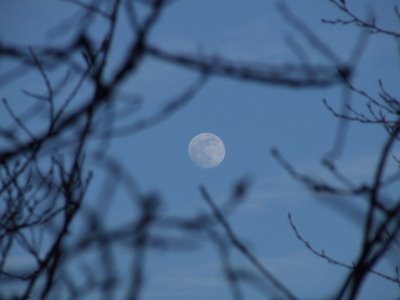The Highlands where we live is dark at night. There are no street lamps and few people have lights on their driveways. The city lights are distant and hidden by the hills allowing for the display of night. When you arrive home late at night, it's hard to miss the stars sparkling as jewels. The moon, anytime larger than half, is enough to light the way on an evening walk. During night walks we take a flashlight, but it comes on only for an oncoming car.
A friend and neighbor was recently lining his short driveway with lights. There were five posts, and each contained four lights. I was impressed by his electrical abilities and even more impressed by his reason for this project. He told me that when his friends come to visit, they might need to park at the top of the driveway. At night, the new lights will guide their way. It was a lot of effort for a few friends to have an easier walk down the hill.
On one hand, I wish I had that type of sacrificial spirit to work so hard for a few folks. He's truly a thoughtful guy and wants to genuinely help others. Yet, on the other hand, I felt some frustration and thought about Edward Abbey.
Abbey was a park ranger at Arches National Monument near Moab, Utah. He spent a number of summers there in the 60's when the park was still primitive, and he wrote about it in Desert Solitaire. He recounted how he rarely used his flashlight at night unless there was some animal life to see. His eyes adjusted to the road well enough without it.
While we often think of a flashlight as something that enlarges our vision and guides our way at night, he believed it had the opposite effect. Like all mechanical objects, it tends to separate us from the world around us. With the flashlight on, eyes become adjusted to the pool of light separating us from the greater world. He saw this as isolation, a limitation of the machine.
He felt this way about most mechanical devices. They serve to isolate us. Our focus becomes on them, and the rest of the world becomes lost. Not that he would have abandoned all things mechanical, but he was cautious to not allow gadgets to separate him from the greater world. Not bad insight for 40 years ago when gadgets and mechanics were fewer.
So, it's only a few lights next door. Going with the thoughts of Abbey, I can become angry to see that the great space around me is becoming harder to see as it becomes lighted. I could feel frustrated that more don't see and appreciate this great night wonderland above.
Yet, those lights might be needed for someone who truly needs them. Maybe one of his friends has poor vision or is elderly. So, I hold my frustration for now and take a look at myself. When I see his driveway lights, they will be a reminder for me. I have my own gadgets that isolate me from friends, family, and the world around me. There are responses to conflict or life when it doesn't go my way, responses that separate me from others and birth isolation. You could call them my personal mechanics. That's where I'll put my attention for now so I can see bigger and wider at all times.
Maybe when I get all those things in order, I'll allow myself just a little frustration for the driveway lamps.


